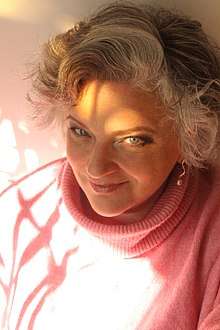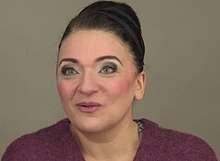Maria Riccarda Wesseling
Maria Riccarda Wesseling is a Swiss-Dutch operatic mezzo-soprano who has appeared in lead roles at international opera houses and festivals. She created the title role in Henze's last opera, Phaedra, at the Staatsoper Berlin, repeated at La Monnaie in Brussels and in the Barbican Centre.

Maria Riccarda Wesseling | |
|---|---|
 in Classique News 2015. | |
| Born | Maria Riccarda Schmid Wattwil, Switzerland |
| Education |
|
| Occupation |
|
| Awards |
|
| Website | www |
Career
Born Maria Riccarda Schmid[1] in Wattwil,[2] she studied with Hedwig Vonlanthen in Solothurn, with Elisabeth Glauser at the Musikhochschule Bern, and with Margreet Honig at the Sweelinck Conservatory in Amsterdam. She appeared as Rossinis La Cenerentola on a tour with the Orchestre National de Lille. She was a regular guest at the Stadttheater Bern, where she performed roles such as Kassandra in Aribert Reimann's Troades, Fenena in Verdi's Nabucco, Enrichetta in Bellini's I puritani, Olga in Tri Sestri by Péter Eötvös, Idamante in Mozart's Idomeneo, Cesare in Handel's Giulio Cesare, and the title role in Bizet's Carmen. She sang leading roles by Handel also at festivals, the title role of Rinaldo at the Lucerne Festival, the title role of Amadigi di Gaula at the Handel Festival Halle and the Festival de Radio France et Montpellier, Sesto in Giulio Cesare at the Festival de Beaune, Medea in Teseo in Halle, and Dejanira in Hercules in Potsdam. Several of these performances were recorded. Wesseling received international attention in 2006, when she stepped in at the Paris Opera for the title role of Gluck's Iphigénie en Tauride, staged by Krzysztof Warlikowski and conducted by Marc Minkowski.[3] She was Iphigénie again in 2011 also at the Teatro Real in Madrid, now conducted by Thomas Hengelbrock. She appeared as Orpheus in Orfeo ed Euridice, staged by Pina Bausch and conducted by Hengelbrock, which was broadcast live by arte and recorded for DVD, and presented not only in Paris but also the Greek theatre in Epidauros, Lincoln Center in New York, and the Teatro Real.[3] Wesseling appeared in Madrid also as Ottavia in Monteverdi's L’incoronazione di Poppea, conducted by Sylvain Cambreling. At the Ruhrtriennale 2015, she was Fricka in Das Rheingold. In 2017, she created the title role in the world premiere of the opera "Annas Maske" by David Philip Hefti. />
In contemporary opera, she performed the title role in the premiere of Henze's Phaedra at the Staatsoper Berlin, repeated at La Monnaie in Brussels and in the Barbican Centre, also Pélérin in Kaija Saariaho's L'Amour de loin at the Finnish National Opera, Irma in Le Balcon by Péter Eötvös in Bordeaux, and Malaspina in Salvatore Sciarrino's Luci mie traditrici in Lyon.[3] She appeared in Claude Vivier's Wo bist Du, Licht at the Ruhrtriennale,[4] and as the Queen in Heinz Holliger's Schneewittchen, staged by Achim Freyer in Basel.[5]
In January 2018, Maria Riccarda Wesseling has presented her first production as stage director with a very successful staging of "The rape of Lucretia" at the Dutch National Opera Academy.
Discography
- Paul Juon (1872–1940): Lieder (coviello classics Juli 2016)[6]
- Wien 1900. Orchesterlieder by Arnold Schönberg, Alban Berg and Gustav Mahler (claves records)[7]
- Handel: Heroines arias (claves records)[7]
- Sous l’eau du songe. Lieder by Clara Schumann, Lili Boulanger and Alma Mahler (claves records)[7]
- Richard Wagner: Werke für Kammerorchester (Original und Adaptationen), with Kammerphilharmonie Graubünden conducted by Marcus Bosch (coviello)[8]
- Charles-Simon Catel: Sémiramis, title role (glossa)[9]
- André-Ernest-Modeste Grétry: Andromaque, Hermione (glossa)[10]
- George Frideric Handel: Rodrigo, title role (ambroisie)[11]
- Handel: Amadigi, title role (ambroisie)[12]
- Handel: Der Messias, alto part (Harmonia Mundi)[13]
- Christoph Willibald Gluck: Orpheus und Eurydike, Orpheus (DVD bei BelAir)[13]
- Jacques Offenbach: Les contes d’Hoffmann, Giulietta (DVD, BelAir)[14]
- Offenbach: La Vie parisienne, Métella (DVD, Virgin Classics)[13]
- Handel: Teseo, Medea (DVD, Arthaus)[13]
Awards
- Silver medal (2nd prize) Robert Schumann International Competition for Pianists and Singers 1996 Zwickau[1]
- Prix Eliette von Karajan 2002[15]
References
- "Winners". Schumann in Zwickau. Retrieved 23 January 2016.
- "Kunst-, Kultur-, Förderungs- & Anerkennungspreise 2004" (in German). Solothurn. Retrieved 18 January 2016.
- "Maria Riccarda Wesseling / Mezzosopran" (in German). Staatstheater Stuttgart. Archived from the original on 8 August 2017. Retrieved 8 August 2017.
- "Maria Riccarda Wesseling" (in German). Ruhrtriennale. Retrieved 8 August 2017.
- Reich, Julian (20 February 2014). "Wesseling und die Ambivalenz der bösen Königin" (in German). Südostschweiz. Retrieved 8 August 2017.
- "Maria Riccarda Wesseling / Clau Scherrer / Paul Juon: Lieder". AllMusic. Retrieved 24 August 2017.
- "Maria Riccarda Wesseling". claves.ch. Retrieved 24 August 2017.
- "Wagner, Werke für Kammerorchester". glossamusic.com. Retrieved 24 August 2017.
- "Charles-Simon Catel (1773–1830) / Sémiramis / Tragédie lyrique. Paris, 1802". glossamusic.com. Retrieved 24 August 2017.
- "Gretry: Andromaque / Niquet, Le Concert Sprituel". ArkivMusic. Retrieved 24 August 2017.
- "Maria Riccarda Wesseling / Clau Scherrer / Paul Juon: Lieder". musicalcriticism.com. Retrieved 24 August 2017.
- Steiger, Karsten (2008). Opern-Diskographie: Verzeichnis aller Audio- und Video-Gesamtaufnahmen (in German). Walter de Gruyter. p. 188. ISBN 3-11-095596-2.
- "Maria Riccarda Wesseling" (in German). rondomagazin.de. Retrieved 24 August 2017.
- "Offenbach: Les Contes d'Hoffmann / Bel Air Classiques: BAC049". prestoclassical.co. Retrieved 24 August 2017.
- "Preise des Eliette von Karajan Kulturfonds" (in German). Graubünden. 30 August 2002. Retrieved 24 August 2017.
External links
- Official website
- Maria Riccarda Wesseling discography at Discogs

- Biography on mariariccardawesseling.com
- Maria Riccarda Wesseling Operabase
- Maria Riccarda Wesseling discography at Discogs

- Maria Riccarda Wesseling, une mezzo chez Handel on ResMusica
- Maria Riccarda Wesseling – Carmen: "Seguedille" on YouTube